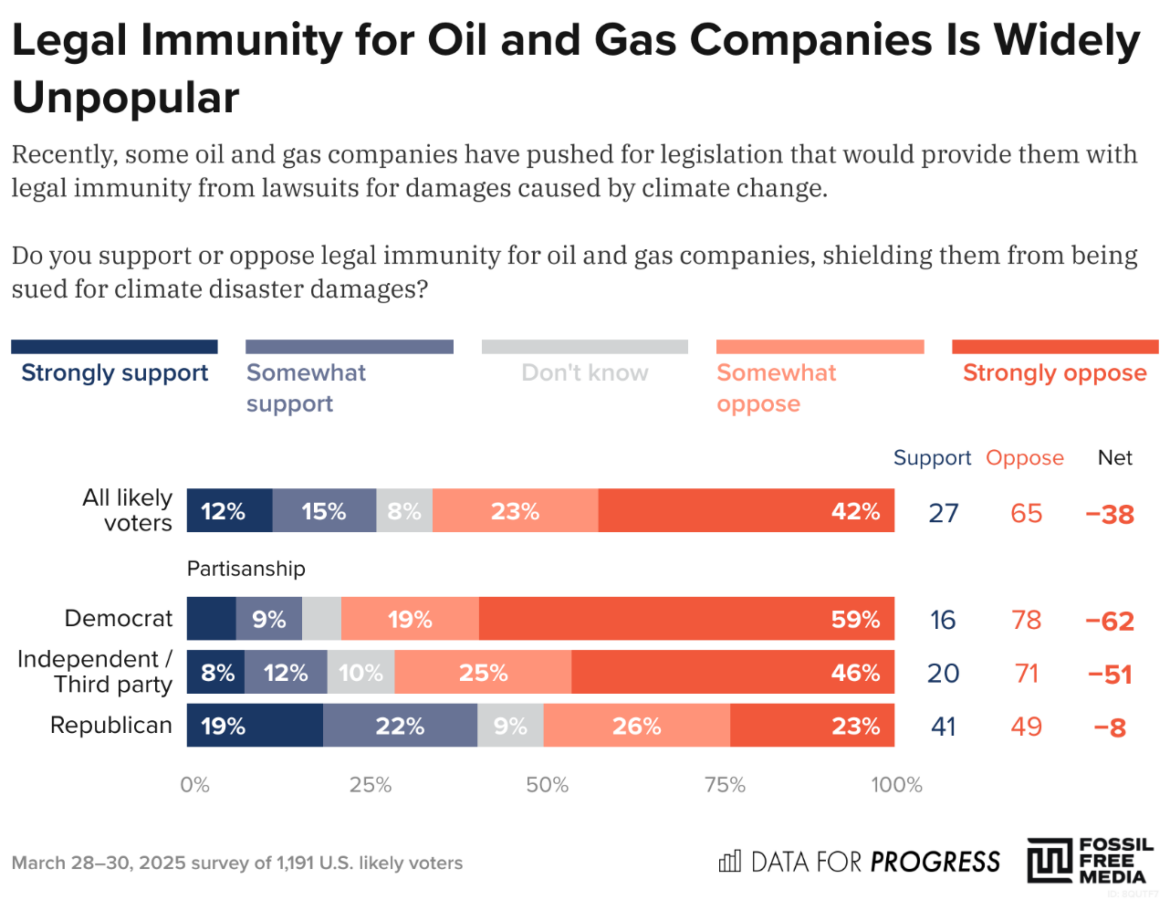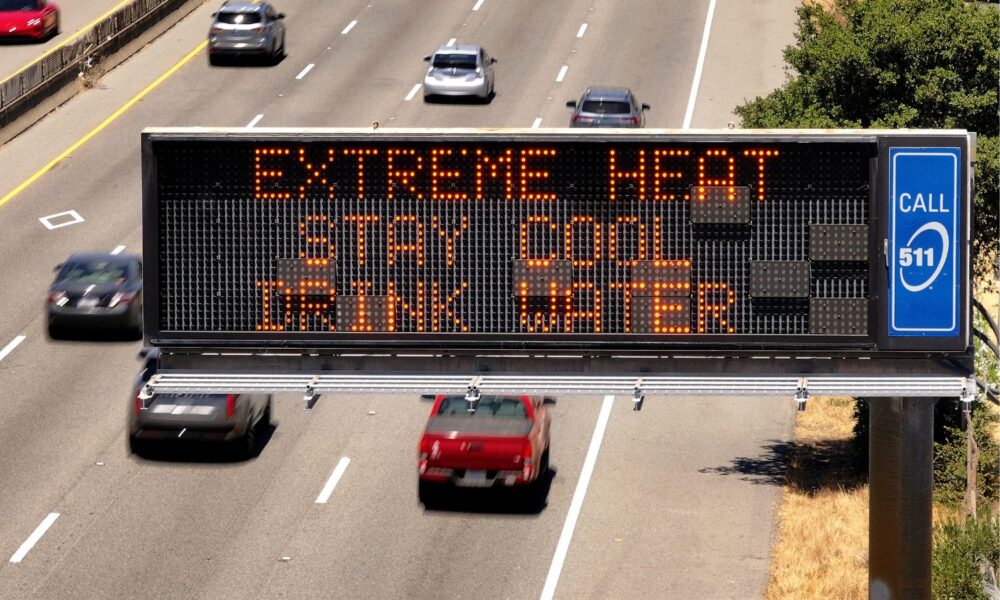For decades, major fossil fuel companies have worked hard to bury the truth: their own research confirmed the dangers their products posed to the planet and people. Yet rather than warn the public or transition away from harm, they chose instead to fund campaigns that misled the public, sowed doubt, and delayed action.
Today, with the release of Decades of Deceit, new evidence emerges that deepens the case against them – and it could not come at a more pivotal moment. In an effort to block climate litigation and superfund-style accountability laws, President Trump’s Department of Justice (DOJ) has filed lawsuits against four states. These actions are arguably a direct attempt to suppress state-led efforts to hold fossil fuel companies responsible for decades of deception.
Decades of Deceit provides the kind of robust, well-documented evidence that these states—and others—can use to demonstrate both the foreseeability of harm and the deliberate misconduct of fossil fuel giants. As the federal government attempts to shield polluters from legal scrutiny, this report serves as a critical counterpoint: a record of what the industry knew, when they knew it, and how they misled the public at every step.
The Union of Concerned Scientists’ latest report, which I was proud to co-author, draws on primary sources and recent investigative findings. It shows, with stark clarity, that the fossil fuel industry’s attempts to avoid accountability are not just a story of the past—they are an ongoing threat today. And these findings raise the stakes for ongoing and future climate litigation.
Expanding the Record
Decades of Deceit brings forward both historical and recent revelations:
- Early choices: As far back as 1959, leading scientists warned fossil fuel executives about the risks of rising carbon dioxide levels. By the mid-1980s, internal company documents acknowledged the need for sharp fossil fuel reductions—or else face a warming world with devastating consequences.
- Deliberate deception: Instead of acting, companies like ExxonMobil and Shell scaled back internal climate research and funded efforts to mislead the public. Exxon scientists recognized the threat in the 1980s; Shell’s confidential 1988 report bluntly predicted dramatic climate shifts—then both companies chose disinformation over disclosure.
- Modern misconduct: In recent years, tactics have shifted but the goals remain the same. Front groups, greenwashing campaigns, lobbying against climate policies, and even allegations of hacking aimed at climate advocates show that the industry continues to prioritize profits over people and the planet. This new evidence contributes to the expanding body of material being used in litigation to demonstrate fossil fuel corporations’ knowledge of climate risks, their role in misleading the public, and the resulting harms to communities.
A Surge in Climate Litigation—and a Counteroffensive
Right now, nearly a quarter of the U.S. population lives in a community suing major fossil fuel companies. From Hawai‘i to Minnesota to Massachusetts, state and local governments are bringing cases grounded in allegations of fraud, deception, and damages—arguing that companies misled the public and policymakers, exacerbating the climate crisis and imposing mounting costs on communities.
These are costs that individuals and taxpayers are now being forced to shoulder, whether through rebuilding after disasters, emergency health responses, or investments in climate resilience. New research published in Nature further illustrates the scale of these harms, estimating trillions of dollars in economic losses from extreme heat alone—directly attributable to emissions from specific fossil fuel companies.
This work is growing, despite escalating efforts to silence it. In a legally unprecedented and politically charged maneuver, the Trump administration filed lawsuits to block four states—Hawai‘i, Michigan, New York, and Vermont—from pursuing climate accountability. The DOJ’s lawsuits follow an executive order aimed at suppressing state climate action and shielding the fossil fuel industry from liability. This overreach attempts to use federal power to quash state efforts to protect residents and ecosystems from climate harm.
Attorney General Anne Lopez of Hawai‘i called the federal interference “a direct attack on Hawai‘i’s rights as a sovereign state.” Her state’s lawsuit, filed a couple days after the DOJ action, names fossil fuel companies and their trade association, the American Petroleum Institute, for decades of deceptive conduct. The complaint specifically cites impacts like the 2023 Maui wildfires—now the deadliest U.S. wildfire in over a century—and widespread threats to water access, coastal erosion, and Native Hawaiian cultural practices.
Meanwhile, in Rhode Island, Chevron’s desperate attempt to delay accountability through a semantic argument was firmly rejected by the court. The case—originally filed in 2018—has survived multiple challenges and is poised to put Big Oil on trial in state court. The judge’s ruling signaled judicial intolerance for delay tactics and emphasized the importance of allowing states to present their full evidence of harm and deception.
The information presented in Decades of Deceit directly informs several critical aspects of legal strategies, including:
- Knowledge and Foreseeability: Courts are increasingly relying on evidence that help establish when companies understood the climate consequences of their actions. This report offers a rich, detailed record of what fossil fuel executives knew—and when they knew it.
- Misrepresentation and Fraud: Cases grounded in consumer protection, fraud, or racketeering statutes often require proof that companies made false or misleading statements. The internal documents and admissions described in the report help inform these elements by showing a gap between internal knowledge and external messaging.
- Obstruction and Damages: Delays in climate action caused by decades of disinformation have real economic and human costs. By tracing the evolution of corporate obstruction tactics, the report informs arguments that companies are not just passively responsible but actively delayed climate action, exacerbating damages.
In short, Decades of Deceit strengthens the evidentiary foundation for courts to assess corporate liability—and empowers communities to pursue justice.
Timing Matters
This evidence arrives at a critical moment. Fossil fuel companies are ramping up efforts to escape accountability. Their procedural maneuvers have delayed litigation for years. Now, faced with cases reaching discovery and trial stages, corporations are reportedly lobbying for federal liability shields—an extraordinary attempt to retroactively immunize themselves from climate lawsuits.
At the same time, President Trump’s executive order attacking states’ rights to pursue climate litigation reveals how deeply fossil fuel interests have intertwined with political power. Attempts to curtail the ability of states, territories, and municipalities to seek redress in the courts threaten both environmental justice and basic democratic principles. In this context, Decades of Deceit is not just a historical record. It is a tool for resistance—a resource for ensuring that the truth cannot be buried again.
The Court of Public Opinion
Litigation is only one path toward climate accountability. Public understanding of corporate deception has shifted significantly over the past decade—much like it did with Big Tobacco. As evidence mounts, fossil fuel companies are facing growing reputational risks that threaten their political influence, investor standing, and public trust.
New polling from Data for Progress and Fossil Free Media underscores this shift. They found that a clear majority oppose granting these companies legal immunity from lawsuits seeking climate-related damages, with opposition cutting across party lines. In fact, a plurality of voters (43%) say oil and gas companies—not working Americans—should shoulder more of these costs. The public is not just skeptical of corporate narratives; it’s increasingly unwilling to foot the bill for corporate misconduct.

The public sees through the fossil fuel industry’s narrative. And many now understand what the lawsuits are about: protecting communities, not punishing energy use. Holding corporations accountable for deception is not radical—it’s necessary.
What’s at Stake
The fossil fuel industry spent decades obscuring the link between its products and a warming world. These corporations understood that acknowledging reality could threaten their business models—and they acted to protect their profits accordingly. Now, we face a simple but profound question: Will those who profited from causing the harm be held responsible for it?
The evidence is overwhelming. The law is evolving. Public opinion is shifting. But accountability is not inevitable—it must be demanded, fought for, and defended.
Enough is enough. Fossil fuel companies must be held accountable in the court of public opinion and in the court of law—not just for what they did decades ago, but for the ongoing harms they cause today.
We cannot allow the truth to be buried again.

